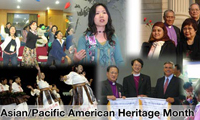Celebrating Asian/Pacific American Heritage Month #5
 The Hmong United Methodist Hymnal was introduced at the Hmong Christian Community United Methodist Church in Milwaukee, Wisconsin, in 2003. The hymnal was the result of seventeen years of preparation by a committee composed of members of the church, with Chou Yang as editor. It contains more than 300 hymns, including many from southeast Asian sources, as well as translations of traditional and contemporary hymns that would be familiar to most English-speaking United Methodists. The hymnal is organized in the same manner as the 1989 United Methodist Hymnal, making use of the same headings and subheadings. It also includes eighteen Wesley hymns.
The Hmong United Methodist Hymnal was introduced at the Hmong Christian Community United Methodist Church in Milwaukee, Wisconsin, in 2003. The hymnal was the result of seventeen years of preparation by a committee composed of members of the church, with Chou Yang as editor. It contains more than 300 hymns, including many from southeast Asian sources, as well as translations of traditional and contemporary hymns that would be familiar to most English-speaking United Methodists. The hymnal is organized in the same manner as the 1989 United Methodist Hymnal, making use of the same headings and subheadings. It also includes eighteen Wesley hymns.
As the Vietnam War was ending and United States forces were returning home in the early 1970s, thousands of Hmong people who had supported and cooperated with the United States during the war feared for their safety. The Hmong were a peaceful, indigenous, agrarian people of Southeast Asia. Many had fled China under persecution by the Communist government there, eventually settling in Laos, Thailand, and Vietnam. With the departure of the United States from Vietnam, the Hmong were fearful of reprisals. Thousands of Hmong people eventually settled in the United States following the war.
Today there are nearly 200,000 Hmong people in the USA. More than 150,000 of them are non-Christian. Many of the Hmong Christians are Christian Missionary & Alliance, Baptist, Lutheran, Reformed, and Roman Catholic. There are about 2,500 Hmong United Methodists in six congregations in Minnesota, Wisconsin, and North Carolina, with four other Hmong UMCs in California.
Most Hmong Christians used the only hymnal in their language available at the time: a words-only edition prepared by the Christian Missionary & Alliance Church. In 1986, the Hmong Community UMC of St. Paul, Minnesota, prepared a text-only hymnal containing 323 hymns, Cov Ntseeg Yesxus Phoo Nkauj, for its own use and for distribution to other Hmong UMCs. By 1990 it was in its fifth edition.
In 1999, with Chou Yang as chair of the hymnal committee and hymnal editor, the Milwaukee Hmong Community UMC formed a committee to begin work on a new hymnal, the first in the Hmong language to contain words and music. It was to be patterned after most traditional hymnals, in particular the 1989 United Methodist Hymnal. Sou Yang, one of the hymnal committee members and an accomplished musician and composer, took on the tasks of typesetting, arranging, and composing new music. The first draft of the new hymnal was completed in 2001, followed by copyright clearance and further editing. The final version was completed and sent to the printer in February 2003, seventeen years after the St. Paul text-only first edition.
Major funding for The Hmong United Methodist Hymnal was provided by Discipleship Ministries, with additional funding from a number of sources, including the Minnesota and Wisconsin Annual Conferences, the Wisconsin United Methodist Foundation, the Asian Caucus, and the Hmong Caucus. Today Discipleship Ministries is closely working with Hmong United Methodists to develop liturgical and ritual resources for Hmong United Methodists as part of the Open Source Liturgy Project.
Contact Us for Help
View staff by program area to ask for additional assistance.
